When Will the Media Stop Trying to Credit Useless Interventions?
Guest Post By Ian Miller
The Atlantic has become synonymous with misinformation
An infuriatingly consistent aspect of COVID coverage has been the media’s apparent duty to credit interventions with positive outcomes.
I’ve chronicled this repeatedly:
But it’s important to showcase how consistent and universal these failings have been throughout the pandemic, because the Chief Medical Advisor to the President continues to push for endless masking:

FAUCI: Going “back to indoor masks” would be the “prudent thing to do”
April 4th 2022
248 Retweets537 Likes
One of the most shameless repeat offenders has been The Atlantic. Apart from a few articles containing some semblance of sanity, mostly written by David Zweig, it’s been an endless stream of propaganda.
You might remember one of the more infamous examples from early in the pandemic, entitled “Georgia’s Experiment in Human Sacrifice”
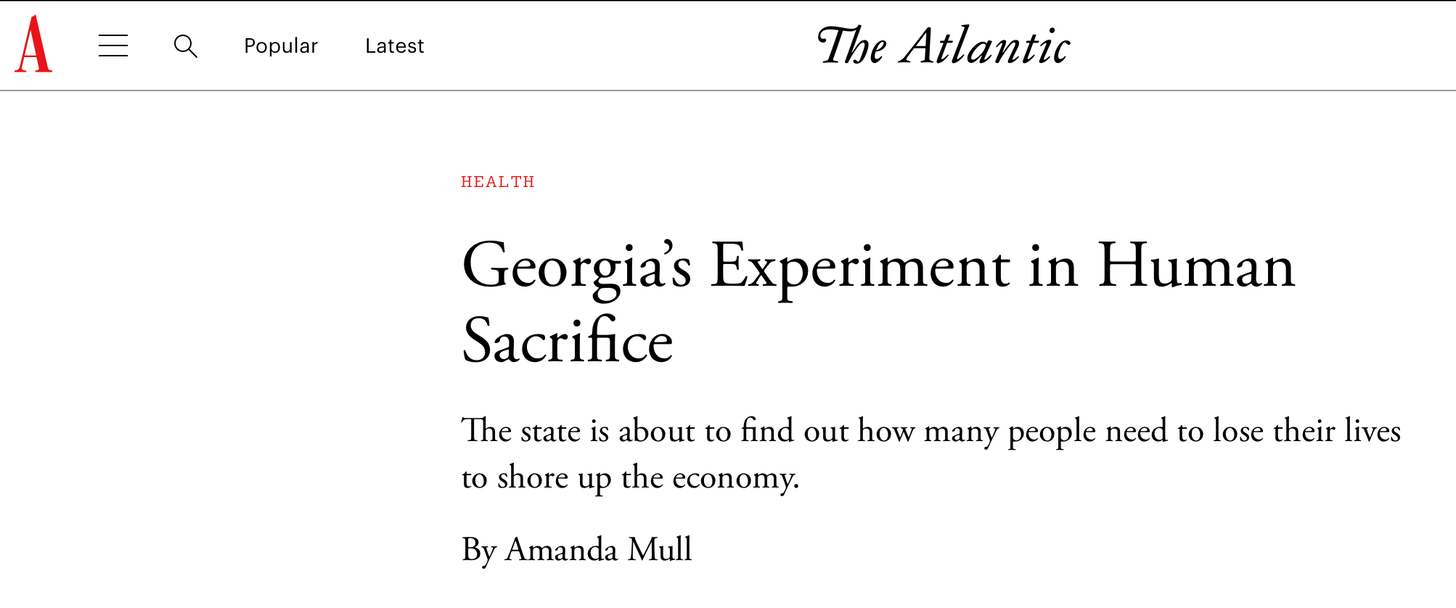
Hyperbole, thy name is The Atlantic. And naturally, here’s what happened afterwards:
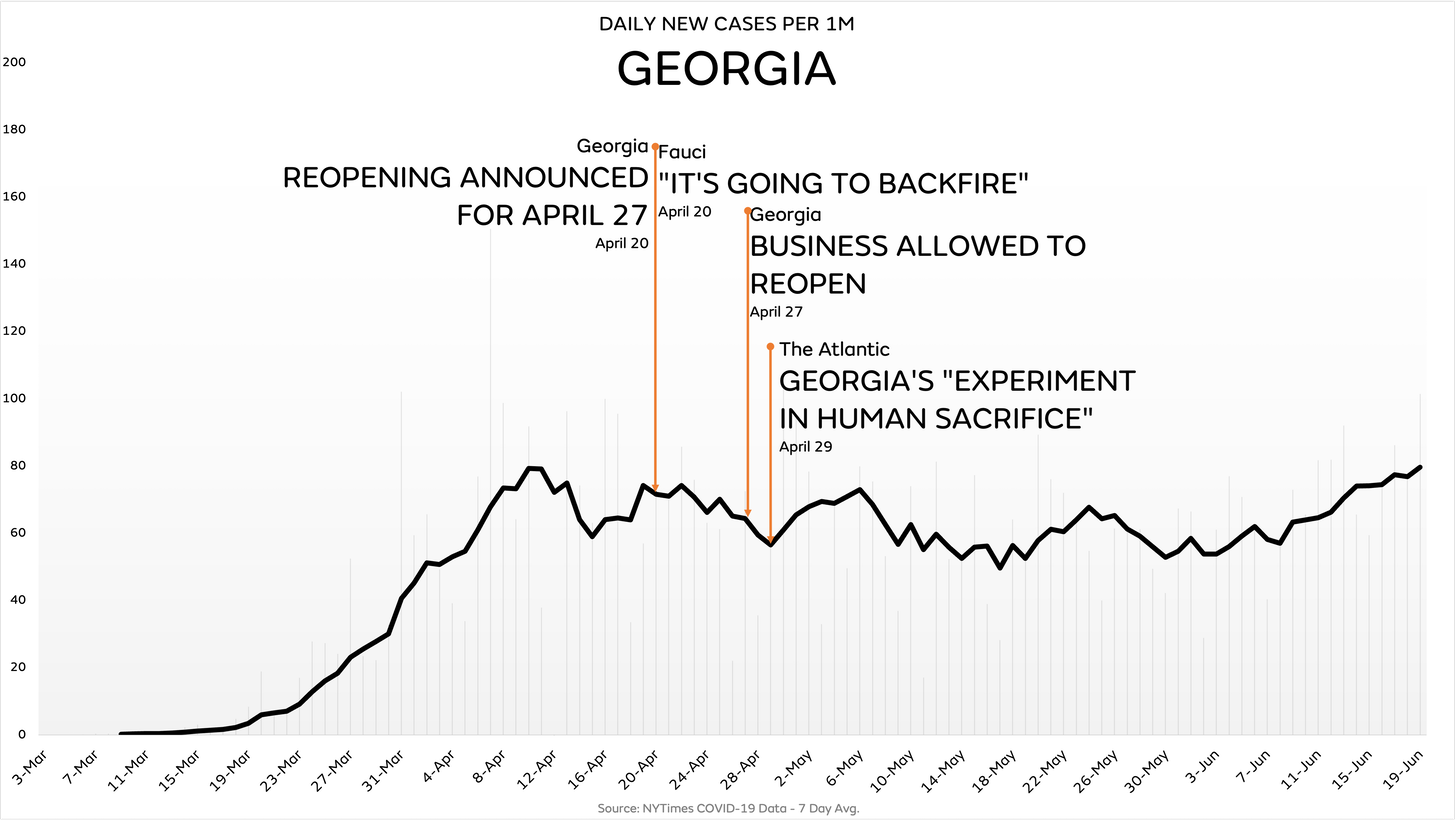
Of course, after Georgia partially reopened in April 2020 with no significant resurgence, The Atlantic immediately recanted their story and rightfully apologized for pushing a false narrative of fear and danger.
Come now, you didn’t believe they’d actually apologize, did you?
As with nearly every other major news outlet, The Atlantic appeared to revel in spreading panic and misery. Whether out of pervasive journalistic groupthink, personal anxieties, the reflexive need to submit to whatever the dominant form of simplistic meme-based cultural acceptable ideologies demands at the given moment, or simply genuine incompetence, their work has been extremely poor.
Instead of celebrating Georgia’s obvious success, showing that businesses could reopen successfully and mask free without suffering immediately devastating consequences, they doubled down. And then tripled down. And then quadrupled down.
By early in the spring of 2020, the emerging story should have been one of good news — the world didn’t need to remain entirely closed, yet that story went completely unmentioned.
The media could have focused on the positive outcomes from areas like Georgia and Florida — but instead did their best to foment conspiracy theories and direct their focus towards the most negative coverage possible.
They seem unwilling or unable to grasp that their ideological enemies were not actually attempting to carry out mass murder by allowing barbershops and other small businesses to reopen.
As with nearly every issue in our modern, sanity-free, cultural hegemony, every action taken by a governor or politician outside of the dominant groupthink was labeled “actual violence.”
Please ignore the nursing home debacle occurring under media darling Andrew Cuomo’s watch. Instead, look at all those people in Georgia getting a haircut. That is unacceptable; the real issue that needed fixing.
The Atlantic then published a bewildering piece by Derek Thompson (I am long blocked on Twitter for expressing my credulity at this story) expressing the absurdly laughable hypothesis that if humanity simply stopped talking for a few weeks, we could dramatically reduce transmission:
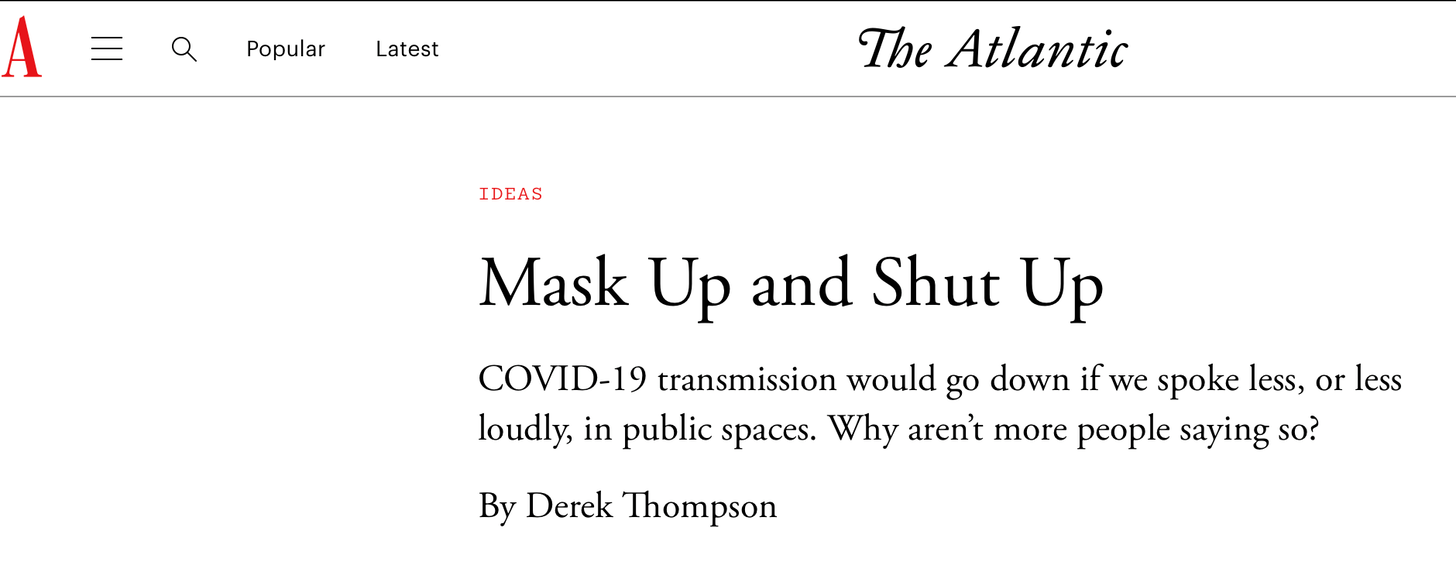
I’ll repeat that again. Humanity should just stop talking for a few weeks.
This “expert” claim was accepted and promoted in a major media publication in the year of our Lord 2020:
Covid-19 researchers have rightly extolled the virtues of masks, hailed the necessity of ventilation, and praised the salutary nature of outdoor activities. But another behavioral tactic hasn’t received enough attention, in part because it makes itself known by its absence. That tactic is silence.
“Every route of viral transmission would go down if we talked less, or talked less loudly, in public spaces,” Jose L. Jimenez, a professor at the University of Colorado at Boulder, who studies disease transmission, told me. “This is just a very clear fact. It’s not controversial.”
Talking less, more quietly, or not at all limits the manufacture of both large droplets and aerosols. When you breathe or whisper, your respiratory system doesn’t emit large droplets. Jimenez told me that, compared with yelling, quiet talking reduces aerosols by a factor of five; being completely silent reduces them by a factor of about 50. That means talking quietly, rather than yelling, reduces the risk of viral transmission by a degree comparable to properly wearing a mask.
The concept of actually requesting humanity cease all verbal communication was seemingly a minor inconvenience:
“The truth is that if everybody stopped talking for a month or two, the pandemic would probably die off,” Jimenez said. While still emphasizing the importance of distancing, he elaborated that without any close-contact communication, it would be difficult for this virus to continue moving between people.
By focusing on useless hypotheticals instead of potentially useful and realistic possibilities that would minimize harms (such as opening schools), the media directed attention towards the encouragement of external blame, the implication being: “It’s the selfish others who won’t just wear a mask. That’s why it’s not over. If we just all did what we told, we’d be much better off.”
This trend unfortunately continued late into 2021, well after it was glaringly obvious that masks and mask mandates were proven to be functionally useless.
Importantly, in October 2021 The Atlantic once again reminded readers that the United States would have seen greater COVID outcomes if policy would have been more stringent and with higher compliance:
And yet I have, since returning to Germany about a month ago, been struck by how much more rational, efficient, and pragmatic the country’s handling of the late stages of the coronavirus pandemic has been. While the American response to COVID-19 has barely gone beyond the measures that were first adopted in the spring of 2020, Germany has phased in a series of additional policies over the past 18 months. None of them adds serious disruptions to daily life, and yet they collectively put the country in a much better position to contain the virus.
…the country’s political officials and health authorities should adopt four measures that can slow the spread of the virus—and reduce the risk of yet another winter wave—without much of a downside.
Congratulations, Germany! Your brilliant COVID policies dramatically reduced “the risk of yet another winter wave—without much of a downside.”
Before we get into what the policies actually were, let’s check to see if Germany did avoid a winter wave:
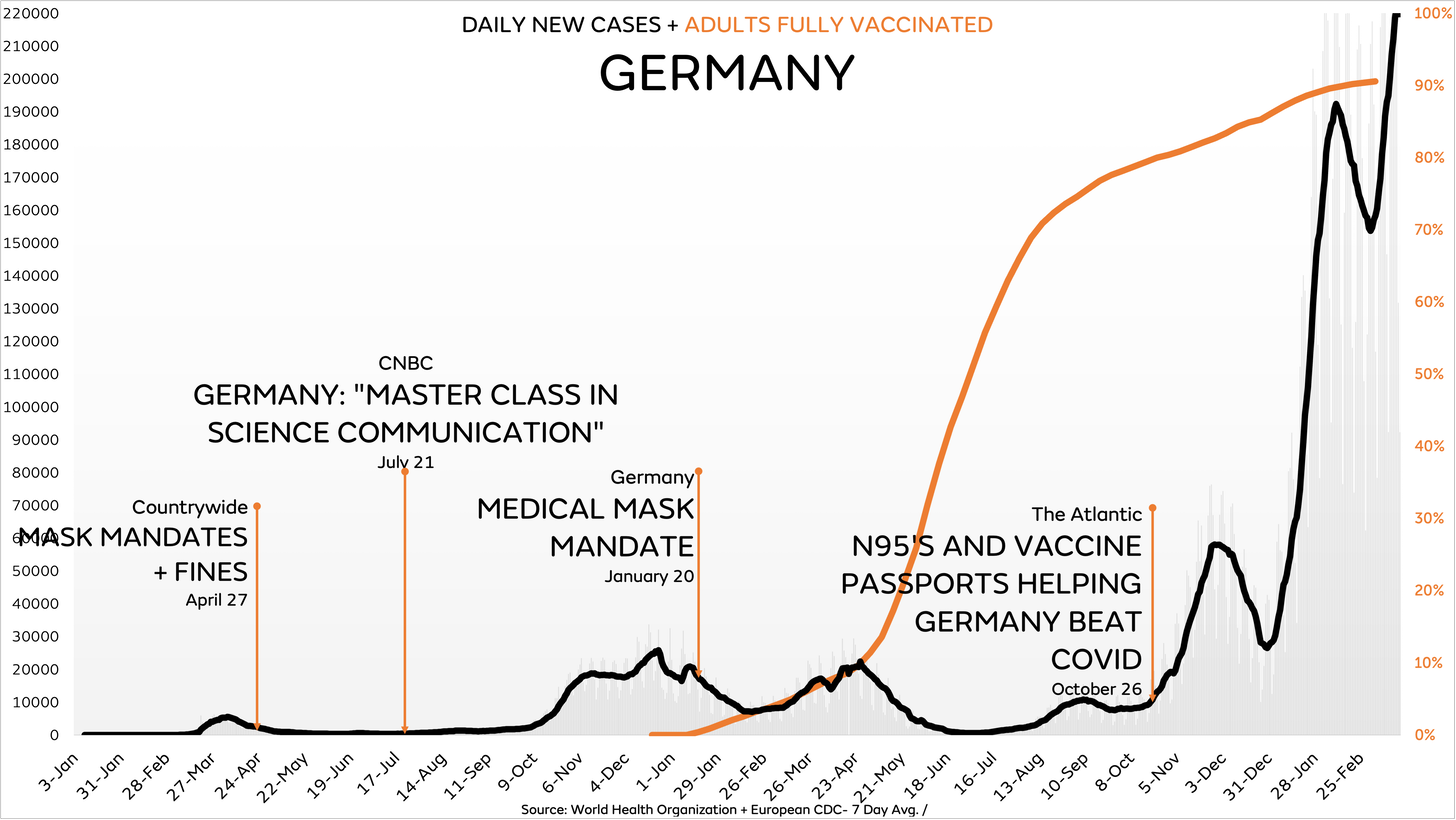
I may not be a high credentialed contributor to The Atlantic, but maybe someone else who’s allowed to comment on COVID policy and outcomes can inform me if that gigantic surge of cases counts as a “winter wave.”
It hit everyone. And if you look closely, cases broke previous records almost immediately after the article was published. Of course, that paled in comparison to the explosion of cases during the winter. The exact thing that The Atlantic said would not happen.
So what were the media-endorsed policies that Germany enacted that were sure to “work” and prevent a surge?
Anybody who wants to dine indoors, go to the theater, or attend a large sporting event has to be vaccinated or have recovered from COVID-19 within the past six months. Those who don’t have such immunity can also participate—but only if they’ve tested negative for the disease within the past 24 hours.
As a result, the majority of people in German cities now live within walking distance of a testing center. They don’t need an appointment, and they get their results by email in less than 15 minutes. Until recently, they did not pay a cent for these “citizens’ tests.” (With most Germans fully vaccinated, eligibility for free tests has been rolled back over the past few weeks—which might be contributing to the recent uptick in cases.)
When I boarded my Lufthansa flight to Germany in September, I was sporting a stylish cloth mask embroidered with the logo of one of my favorite organizations. As I entered the plane, a flight attendant politely stopped me. Handing me a surgical FFP2 mask (which is similar to those marketed as a KN95 in the United States), she told me that cloth masks were not approved for use aboard the airplane. The same rule, it turns out, applies to most public spaces in Germany.
But studies soon suggested that cloth masks are less effective than surgical masks at stopping the spread of COVID-19. And so once FFP2 masks became widely available, Germany encouraged its citizens to wear them instead. They are now so ubiquitous that I don’t recall having seen a single cloth mask since arriving in the country a month ago.
And of course one of my personal favorites:
4. Figure Out Contact Tracing
So to briefly summarize the simple, easily mandated suggestions from The Atlantic on how to prevent the spread of COVID:
- Vaccine passports
- Mass testing
- High quality masks with extremely high compliance
- Contact Tracing
So there we have it. That’s all you have to do, be like Germany. These “science-based” measures, which had never been attempted pre-COVID, are somehow proven to beat COVID if you just comply. Never mind the absurdity of claiming vaccine passports, which are useless, have very few harms. This is how Germany would be able to report lower numbers during the winter than those country bumpkins in the US.
Except:
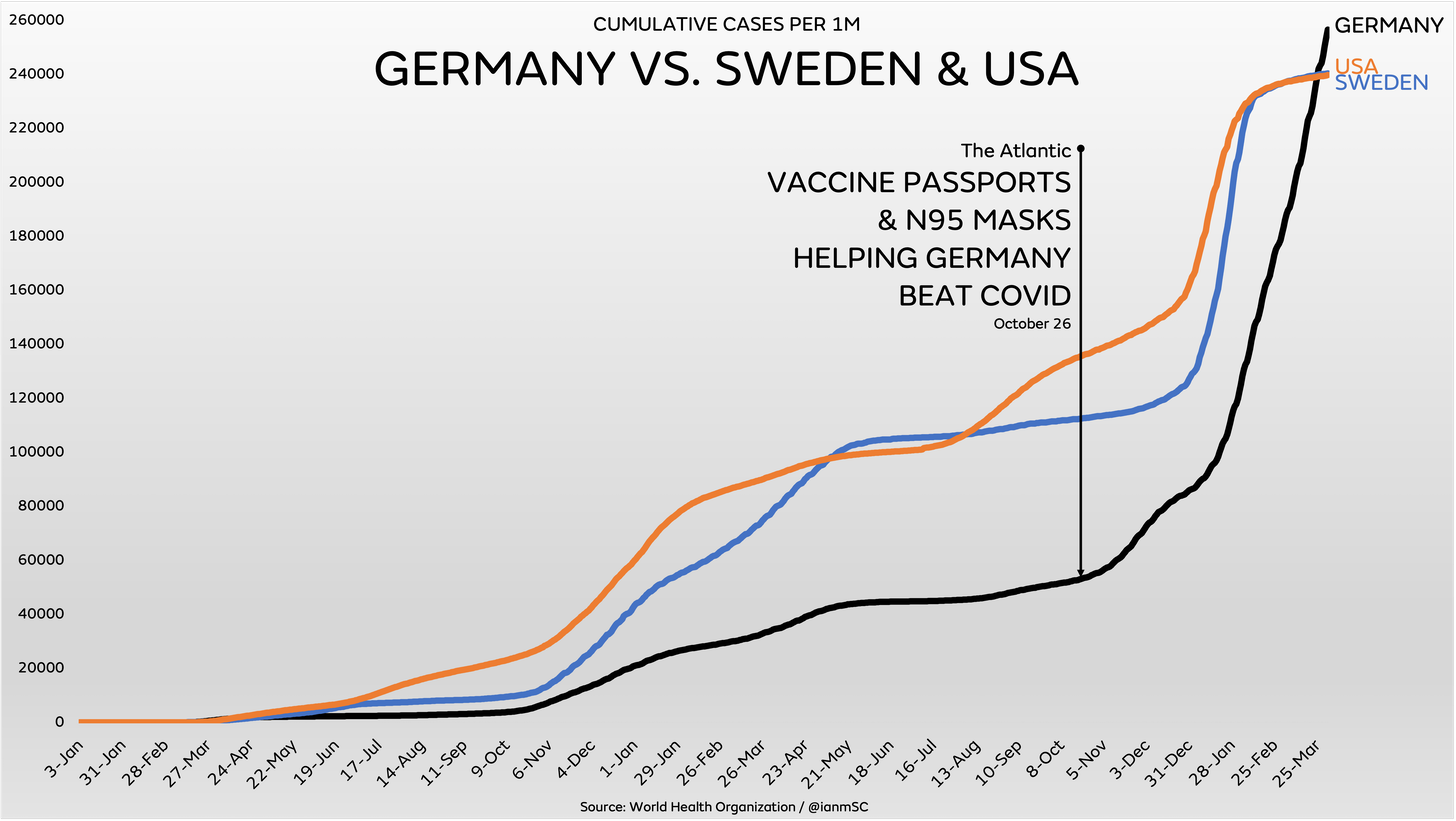
Whoops! Germany’s now reported more new population adjusted cases than the United States has.
The vaccine passports, the N95 level masking with near universal compliance, the contact tracing, mass testing and the significantly higher intelligence level of the German government’s policy — it all just magically stopped working.
But those are just cases! What about deaths?! Maybe the vaccine passports and masking saved lives, which would be especially beneficial given that they have no harms, according to The Atlantic.
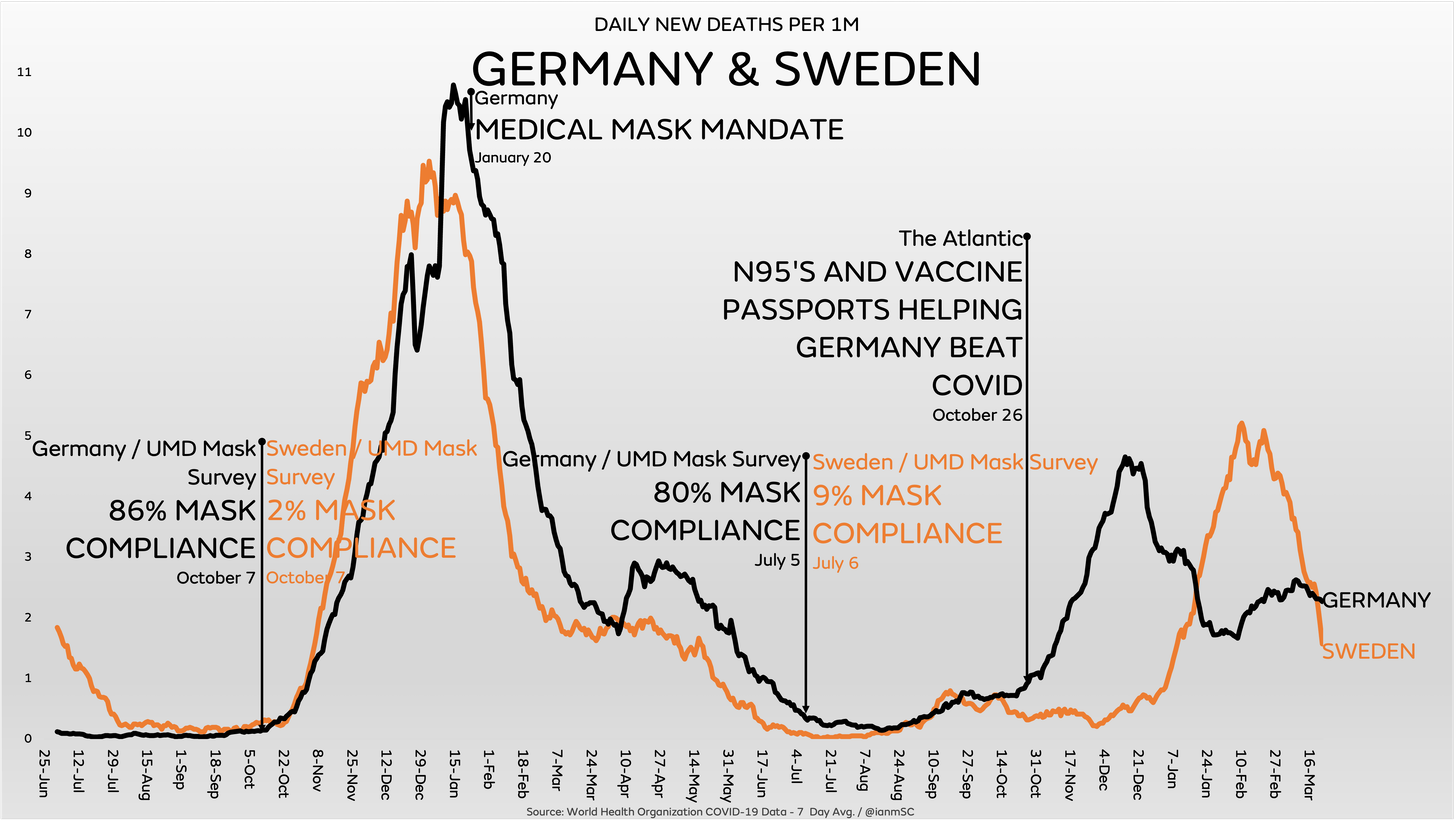
Deaths, while mercifully much lower than the peak in 2020-2021, obviously saw a significant increase in late 2021 and into 2022. And of course, they’ve outpaced Sweden for the vast majority of the past year and a half, with these pandemic “mitigations” in place already.
It’s more of the same when considering excess mortality:
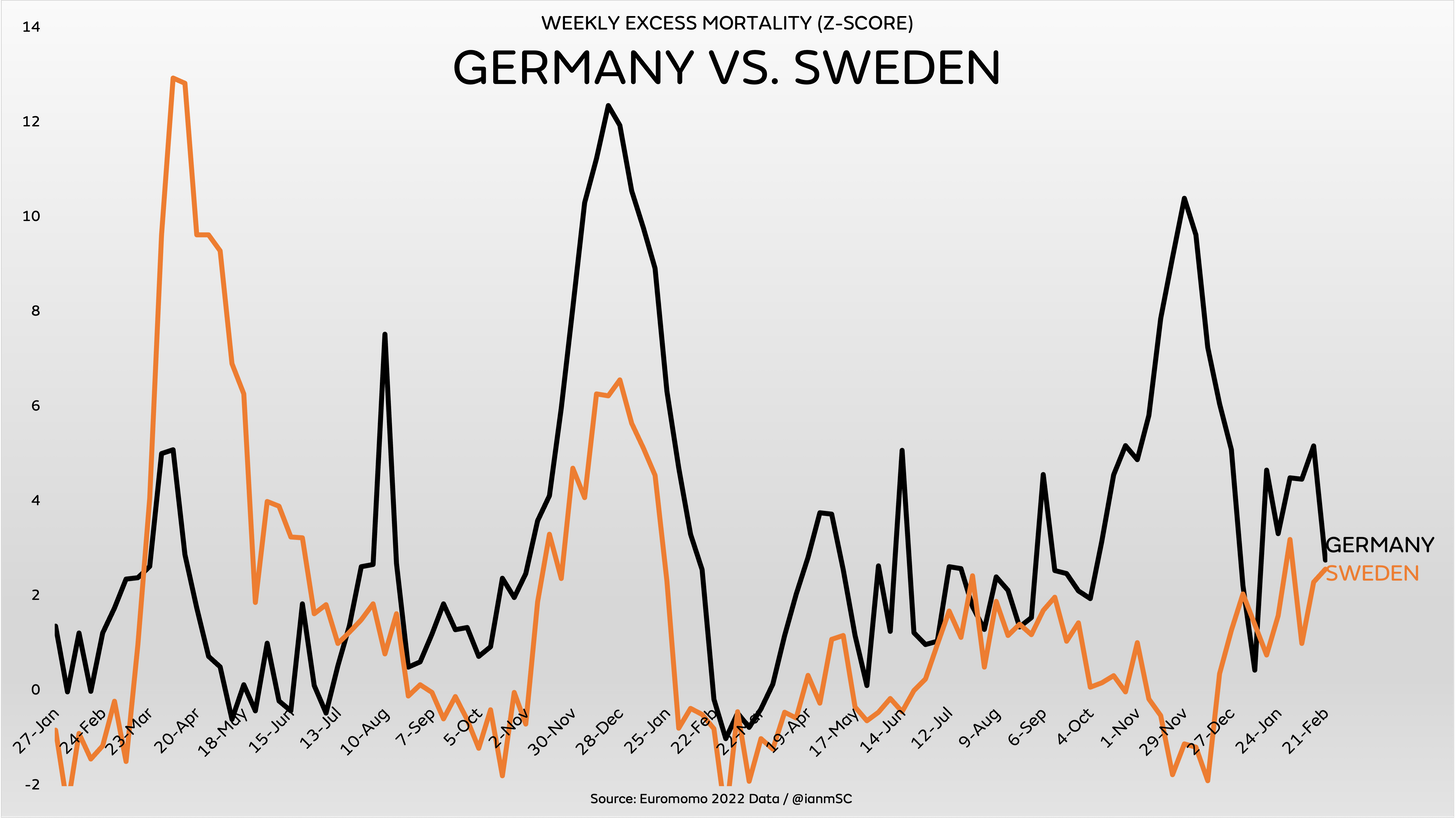
In nearly every possible way, Germany’s much heralded “COVID success” collapsed almost immediately after yet another cringeworthy article from the mainstream press spread demonstrably false information on how smart the Germans were compared to the idiotic Americans or other countries.
The pervasive groupthink and echo chamber of major media outlets has allowed for COVID policies to continue essentially unchallenged for multiple years. No matter how much evidence accumulates that their assertions, their advocacy and their smirking superiority are woefully inaccurate, they cannot tolerate a permanent return to normalcy.
And in yet another perfectly fitting conclusion of their desperation to justify the intense feelings of innate self importance following COVID policy gives them, influential journalists like The Washington Post’s Taylor Lorenz join Twitter communities started by an incompetent nutritionist desperate to maintain his relevancy.
Based on their track record, would it surprise anyone to see a return to incompetent advocacy from The Atlantic at the first sign of an increase? After all, it’s so much easier to say “if we all were just like country X, things would be better” than to acknowledge that policies and compliance don’t matter.
But hey, at least they’re hosting a summit on “disinformation”:



